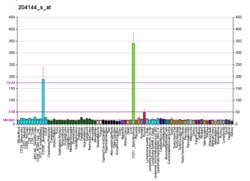From Wikipedia, the free encyclopedia
Protein-coding gene in the species Homo sapiens
Phosphatidylinositol N-acetylglucosaminyltransferase subunit Q is an enzyme that in humans is encoded by the PIGQ gene .[ 5] [ 6] [ 7]
This gene is involved in the first step in glycosylphosphatidylinositol (GPI)-anchor biosynthesis. The GPI-anchor is a glycolipid found on many blood cells and serves to anchor proteins to the cell surface. This gene encodes a N-acetylglucosaminyl transferase component that is part of the complex that catalyzes transfer of N-acetylglucosamine (GlcNAc) from UDP-GlcNAc to phosphatidylinositol (PI).[ 7]
PIGQ has been shown to interact with PIGH ,[ 5] PIGA [ 5] PIGC .[ 5]
^ a b c GRCh38: Ensembl release 89: ENSG00000007541 – Ensembl , May 2017^ a b c GRCm38: Ensembl release 89: ENSMUSG00000025728 – Ensembl , May 2017^ "Human PubMed Reference:" . National Center for Biotechnology Information, U.S. National Library of Medicine .^ "Mouse PubMed Reference:" . National Center for Biotechnology Information, U.S. National Library of Medicine .^ a b c d Watanabe R, Inoue N, Westfall B, Taron CH, Orlean P, Takeda J, Kinoshita T (Mar 1998). "The first step of glycosylphosphatidylinositol biosynthesis is mediated by a complex of PIG-A, PIG-H, PIG-C and GPI1" . EMBO J . 17 (4): 877–85. doi :10.1093/emboj/17.4.877 . PMC 1170437 PMID 9463366 . ^ Tiede A, Schubert J, Nischan C, Jensen I, Westfall B, Taron CH, Orlean P, Schmidt RE (Nov 1998). "Human and mouse Gpi1p homologues restore glycosylphosphatidylinositol membrane anchor biosynthesis in yeast mutants" . Biochem J . 334 (3): 609–16. doi :10.1042/bj3340609 . PMC 1219730 PMID 9729469 . ^ a b "Entrez Gene: PIGQ phosphatidylinositol glycan anchor biosynthesis, class Q" .
Rual JF, Venkatesan K, Hao T, et al. (2005). "Towards a proteome-scale map of the human protein-protein interaction network". Nature . 437 (7062): 1173–8. Bibcode :2005Natur.437.1173R . doi :10.1038/nature04209 . PMID 16189514 . S2CID 4427026 . Martin J, Han C, Gordon LA, et al. (2005). "The sequence and analysis of duplication-rich human chromosome 16" . Nature . 432 (7020): 988–94. Bibcode :2004Natur.432..988M . doi :10.1038/nature03187 PMID 15616553 . Gerhard DS, Wagner L, Feingold EA, et al. (2004). "The status, quality, and expansion of the NIH full-length cDNA project: the Mammalian Gene Collection (MGC)" . Genome Res . 14 (10B): 2121–7. doi :10.1101/gr.2596504 . PMC 528928 PMID 15489334 . Colland F, Jacq X, Trouplin V, et al. (2004). "Functional proteomics mapping of a human signaling pathway" . Genome Res . 14 (7): 1324–32. doi :10.1101/gr.2334104 . PMC 442148 PMID 15231748 . Ota T, Suzuki Y, Nishikawa T, et al. (2004). "Complete sequencing and characterization of 21,243 full-length human cDNAs" . Nat. Genet . 36 (1): 40–5. doi :10.1038/ng1285 PMID 14702039 . Strausberg RL, Feingold EA, Grouse LH, et al. (2003). "Generation and initial analysis of more than 15,000 full-length human and mouse cDNA sequences" . Proc. Natl. Acad. Sci. U.S.A . 99 (26): 16899–903. Bibcode :2002PNAS...9916899M . doi :10.1073/pnas.242603899 PMC 139241 PMID 12477932 . Tiede A, Daniels RJ, Higgs DR, et al. (2001). "The human GPI1 gene is required for efficient glycosylphosphatidylinositol biosynthesis". Gene . 271 (2): 247–54. doi :10.1016/S0378-1119(01)00510-8 . PMID 11418246 . Daniels RJ, Peden JF, Lloyd C, et al. (2001). "Sequence, structure and pathology of the fully annotated terminal 2 Mb of the short arm of human chromosome 16" . Hum. Mol. Genet . 10 (4): 339–52. doi :10.1093/hmg/10.4.339 PMID 11157797 . Watanabe R, Murakami Y, Marmor MD, et al. (2000). "Initial enzyme for glycosylphosphatidylinositol biosynthesis requires PIG-P and is regulated by DPM2" . EMBO J . 19 (16): 4402–11. doi :10.1093/emboj/19.16.4402 . PMC 302040 PMID 10944123 . Hong Y, Ohishi K, Watanabe R, et al. (1999). "GPI1 stabilizes an enzyme essential in the first step of glycosylphosphatidylinositol biosynthesis" . J. Biol. Chem . 274 (26): 18582–8. doi :10.1074/jbc.274.26.18582 PMID 10373468 . Watanabe R, Kinoshita T, Masaki R, et al. (1996). "PIG-A and PIG-H, which participate in glycosylphosphatidylinositol anchor biosynthesis, form a protein complex in the endoplasmic reticulum" . J. Biol. Chem . 271 (43): 26868–75. doi :10.1074/jbc.271.43.26868 PMID 8900170 .





